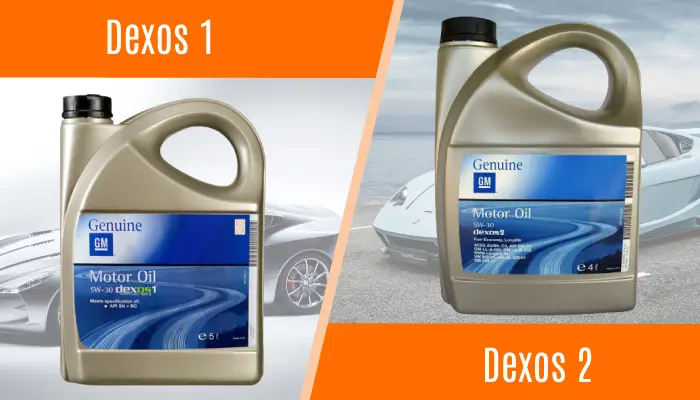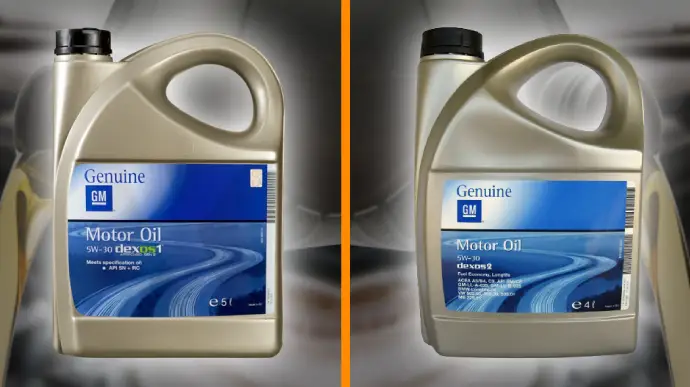Physical Address
304 North Cardinal St.
Dorchester Center, MA 02124
Physical Address
304 North Cardinal St.
Dorchester Center, MA 02124

Dexos 1 and Dexos 2 are two different types of engine oils that General Motors (GM) developed to cater to different types of engines. Both are high-quality engine oils, but they have their own unique properties that set them apart from each other.
The Dexos 1 oil is exclusively designed for gasoline engines, especially the new Gasoline Direct Injection (GDI) engines. It offers a higher viscosity ratio that suits various temperature conditions.
Meanwhile, Dexos 2 oil is primarily intended for GM’s light-duty diesel engines. However, it is also compatible with some European gasoline engines, making it more versatile in terms of the engines it can use.
Additionally, with its lower viscosity, it excels in low-temperature environments, ensuring efficient oil flow even in extremely cold conditions.
We will explain the distinctions between Dexos 1 and Dexos 2 engine oils so you can decide which is best for your vehicle.

When comparing Dexos 1 and Dexos 2 engine oil, several key differences exist, highlighting how they cater to different engine types and performance requirements.
Dexos 1 is the engine oil for you if you own a gasoline engine. It’s specifically designed for gasoline engines, including General Motors’ new gasoline direct injection (GDI) engines.
By providing excellent lubrication and reducing engine wear, Dexos 1 ensures optimal performance and protection.
On the other hand, if you have a light-duty diesel engine or a European gasoline engine, Dexos 2 is the recommended engine oil.
While Dexos 2 is designed primarily for GM’s light-duty diesel engines, it’s also compatible with some European gasoline engines. This versatility makes Dexos 2 suitable for a wider range of engines.
Dexos 1 has a higher viscosity ratio, enabling it to handle both high-temperature and low-temperature environments. It’s an excellent choice if you live in an area with extreme temperature conditions, as it reduces engine strain.
With a wider range of viscosity grades, including 0W-20, 5W-20, and 5W-30, Dexos 1 provides greater flexibility in choosing the right oil for your engine and climate.
Conversely, Dexos 2 has a lower viscosity, making it ideal for low-temperature environments. It ensures efficient oil flow, even in extremely cold conditions, which is why it’s a preferred choice in such climates.
However, Dexos 2 does provide fewer options when it comes to viscosity grades, mainly in the factory fill category, with commonly found grades of 5W-30 and 5W-40. This might limit your choices, especially if you have specific requirements for your engine.
Dexos 1 has superior-quality synthetic additives that help reduce oxidation through Low-Speed Pre-Ignition (LSPI) tests. This feature makes it ideal for those who prioritize long engine life.
Due to its high-quality additives, Dexos 1 provides longer engine life, making it the preferred choice for many. However, as with all engine oils, it’s essential to ensure strict oil change intervals are maintained to keep up engine performance.
In comparison, Dexos 2 may result in shorter engine life if oil change intervals are not strictly adhered to. Due to its tendency to create more sludge, it’s crucial to change the oil at the recommended intervals to prevent any buildup in the engine.
That being said, Dexos 2 is still a high-quality engine oil, especially in low-temperature environments, making it a preferred choice for those living in colder climates.
Dexos 1 and Dexos 2 differ in the composition and quality of their additives. In general, Dexos 1 contains additives that are well-suited for gasoline engines. These additives are designed to prevent carbon deposits, reduce oxidation, and maintain engine cleanliness.
The high quality of its synthetic additives makes Dexos 1 superior in terms of engine protection and performance.
In contrast, Dexos 2 is formulated with additives that are more geared toward the needs of diesel engines. It focuses more on reducing soot production, which is a common concern in diesel engines.
While Dexos 2 is still a good quality engine oil, it offers inferior additives compared to Dexos 1. This difference can affect engine cleanliness and longevity, making Dexos 1 the better choice for gasoline engines.
When selecting between Dexos 1 and Dexos 2 engine oil, you have to consider their differences in API specification.
Dexos 1, initially operating under the API specification CK-4, is specifically tailored for gasoline engines. On the other hand, Dexos 2 complies with the API specification CJ-4+, which caters to the requirements of both diesel and gasoline engines.
The API specification is crucial in determining the oil’s compatibility with different engine types and operating conditions. Dexos 1 is designed to meet the needs of gasoline engines, while Dexos 2 extends its compatibility to include diesel engines as well.
Therefore, when choosing between Dexos 1 and Dexos 2, it’s crucial to consider the API specification that aligns with your engine type to ensure optimal performance and protection.
To understand the differences compared with Dexos 1 and Dexos 2 engine oil, it’s important to consider the sulfur content in each.
Dexos 1 engine oil typically has a lower sulfur content, making it suitable for gasoline engines with emissions control systems. The lower sulfur content helps protect emissions systems and allows for the use of catalytic converters and oxygen sensors.
Meanwhile, Dexos 2 engine oil, designed for diesel engines and some gasoline engines, may have a slightly higher sulfur content. This is because diesel engines, especially older ones, require robust additives to manage the combustion process.
However, the higher sulfur content in Dexos 2 can harm emissions control systems in gasoline engines. Therefore, it’s crucial to select the appropriate engine oil based on the sulfur content and your engine type.
If you have a gasoline engine with emissions control systems, using Dexos 1 engine oil can help optimize fuel consumption and protect your emissions systems.
Dexos 1 is specifically formulated to improve fuel economy in gasoline engines. Its precise composition enhances the combustion process, resulting in reduced fuel consumption. By using Dexos 1, you can potentially save on fuel costs and reduce your environmental impact.
On the other hand, Dexos 2 is primarily designed for diesel engines and may not provide the same level of fuel economy optimization as Dexos 1 in gasoline engines.
While Dexos 2 can be used in some gasoline engines, it focuses more on reducing soot production and ensuring engine cleanliness rather than fuel efficiency. Therefore, if fuel economy is your priority, Dexos 1 is the recommended choice for gasoline engines.
| Aspect | Dexos 1 | Dexos 2 |
| Targeted Engines | Gasoline engines | Light-duty diesel and some gas engines |
| Viscosity Ratio and Temperature Suitability | Higher viscosity suitable for various temperatures | Lower viscosity optimized for cold conditions |
| Engine Longevity | Longer engine life due to high-quality additives | May result in shorter engine life, especially with infrequent oil changes |
| Additives Composition and Quality | High-quality additives for gasoline engines | Formulated with a focus on reducing soot production, suitable for diesel engines |
| API Specification | Initially under API CK-4 for gasoline engines | Complies with API CJ-4+ for both diesel and gasoline engines |
| Availability of Viscosity Grades | Wider range of viscosity grades (e.g., 0W-20, 5W-20, 5W-30) | Fewer options (commonly 5W-30 and 5W-40) |
| Sulfur Content | Lower sulfur content for emissions control | Slightly higher sulfur content suitable for diesel engines |
| Fuel Consumption | Optimized for fuel economy | Focused on reducing soot production |
There are a few cases where conventional (non-synthetic) options are available for Dexos 1 and Dexos 2. However, it’s important to note that most Dexos-rated oils in the market are synthetic or synthetic blends.
These formulations are specifically designed to meet the stringent performance and quality standards set by General Motors. Synthetic oils offer superior lubrication properties, better resistance to high temperatures, and improved engine protection compared to conventional oils.
Meanwhile, synthetic blends combine the benefits of synthetic and conventional oils, providing a balance between performance and cost. It’s recommended to check the product labels and descriptions to ensure the oil you choose meets the Dexos specifications and is suitable for your vehicle’s engine.

Using non-Dexos oil in your GM vehicle can reduce performance and potentially void your warranty. Dexos-approved oils are specifically formulated to meet the unique requirements of GM engines, providing optimal protection and performance.
Non-Dexos oils may lack the necessary additives and specifications to effectively lubricate and protect your engine, leading to increased wear and potential damage over time. These oils may also fail to meet the stringent cleanliness standards set by GM, resulting in the formation of harmful deposits and sludge.
Additionally, using non-Dexos oil could void your warranty, as it deviates from the manufacturer’s recommended guidelines. To ensure the longevity and reliability of your GM vehicle, it’s crucial to adhere to the use of Dexos-approved oils.
Dexos 1 and Dexos 2 oils are compatible with various vehicle brands beyond GM, allowing you to confidently use them in various cars as long as they meet the required specifications. These oils adhere to industry standards such as API and ILSAC, making them suitable for both GM and non-GM vehicles.
This means that you can use Dexos oils in cars from brands like Volkswagen, BMW, and Mercedes-Benz, provided that the oil meets the specifications required by your specific vehicle.
The compatibility of Dexos oils with different car brands ensures that you can maintain the performance and health of your engine, without compromising on quality.
To ensure optimal engine performance and longevity, following the manufacturer-recommended intervals for changing your Dexos 1 or Dexos 2 oil is important. The frequency of oil changes can vary depending on your vehicle’s model year and engine type.
General guidelines suggest intervals ranging from 5,000 to 15,000 miles or more. However, it’s crucial to consult your owner’s manual for precise recommendations tailored to your vehicle’s needs.
Both Dexos 1 and Dexos 2 engine oils are designed with specific engines and conditions in mind, catering to the diverse needs of modern vehicles.
Dexos 1 excels in gasoline engines, offering high-quality additives, longer engine life, and fuel economy optimization. In contrast, Dexos 2 serves a broader range of engines, emphasizing compatibility with light-duty diesel engines and excelling in low-temperature environments.
While both oils meet high industry standards, choosing the right one depends on your engine type and the conditions in which you drive.
Regardless of your choice, adhering to recommended oil change intervals is key to maintaining your engine’s performance and longevity.